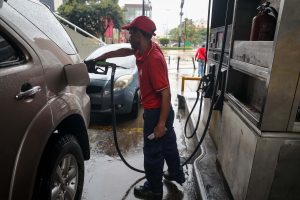Caracas, Sep 24 (EFE).- Venezuelans on Monday continued to enjoy the world’s cheapest gasoline, but uncertainty arose regarding the new payment mechanism for petroleum products which entered into a test phase on the same day, with which the government aims to reduce subsidies and establish an “international” rate.

As announced last week by president Nicolas Maduro, gas stations across the country opened on Monday with personnel assigned by the government to guide citizens on the transition to the so-called “biopago” system.
The so-called Bolivarian revolution seeks to move from the current payment system that is exclusively in cash to a new mechanism based on an electronic device that includes a biometric reader, a payment card reader as well as a reading system for digital identification cards with QR codes (Quick Response Code).
Although Maduro has yet to announce when the new fuel price will officially enter into force and how much the increase will be, what has been clear is that the general subsidy of gasoline prices which has prevailed in the oil-producing country for decades, will be reduced to only those registered with the so-called “carne de la patria” identity card.
According to data from the government, slightly more than half of the population and about three million vehicles are registered for the card in Venezuela. Having the card, which was criticized by the government’s opponents as a weapon of social and political control, will be the only way to maintain the low gasoline prices in the country.
